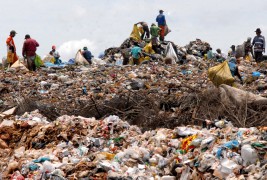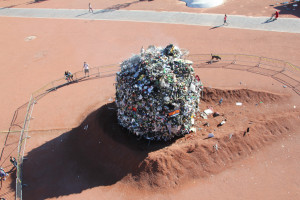by Frank Ferreri
The adage about a road paved with good intentions probably fits a good many of us in contemporary U.S.A. culture. We recycle, we prioritize the reusable, and we teach our children to take care of the planet. But for most of us, without twice-weekly trash service, we’d have more garbage in our homes than we’d know what to do with.
For some of us, even those of us with the most well-meaning intentions, garbage piles up. Today, the average American will generate 4.54 pounds of trash. And tomorrow, it will be another 4.54 pounds, just like it was yesterday, and just like it will be the day after tomorrow and the day after that and the day after that and every day after that that we live.
As Anthony Doerr puts it in “Garbage Night,” which originally appeared in The Morning News, “We Americans are the best trash-makers the world has ever seen. We are the maestros of refuse, champions of rubbish.” For Doerr, the American proclivity for garbage production hit home after he became a parent. And indeed it seems that raising children now is somehow incomplete without disposable supplies and layers of plastic packaging.
Doerr’s basic position is that the challenge is a product of culture. We buy a lot. Our kids have a lot – even though only 4 percent of the world’s children are American, that 4 percent consumes 40 percent of the world’s toys.
We throw out a lot. Most of the American mainstream is aware of the problem and wishes to do something about it. Yet, Doerr reports, the U.S. Geological Survey last year found that earthworms in farm fields have an average of 31 pollutants in their bodies, including caffeine, disinfectants, and Prozac.
Doerr suggests that the key to change is finding the right motivation. In his case, it’s his children. To be sure, the basic urge to protect one’s children from harm and “the overwhelming, almost depthless reservoir of feeling we have for our children” may be “the best place to start.” Whether it’s enough is another question.
The kind of “love and hope” that Doerr offers up as the path toward change can’t stop with only those we can put a face on. Instead, if it’s to last, and if it’s to really change our habits to the degree necessary to reverse climate change, halt deforestation, and restore wildlife, it will take a love and hope for children we don’t know all over the world and children we will never know in the future.
Self-preservation or concern for the next generation or two won’t likely be a strong enough push to get the job done, but a deep commitment to nameless, faceless, unknown strangers and their children is required. That’s a tough sell to the busy diaper-changing, car seat-toting contemporary U.S.A. parent, so Doerr’s suggestion is a good starting point.
If nothing else, it can be the source of “the discipline, the maturity, and the farsightedness we’re going to need,” as he phrases it.
To read the full text of “Garbage Night,” click here: http://www.themorningnews.org/article/garbage-night
Frank Ferreri is an editor in south Florida.



Leave a Reply